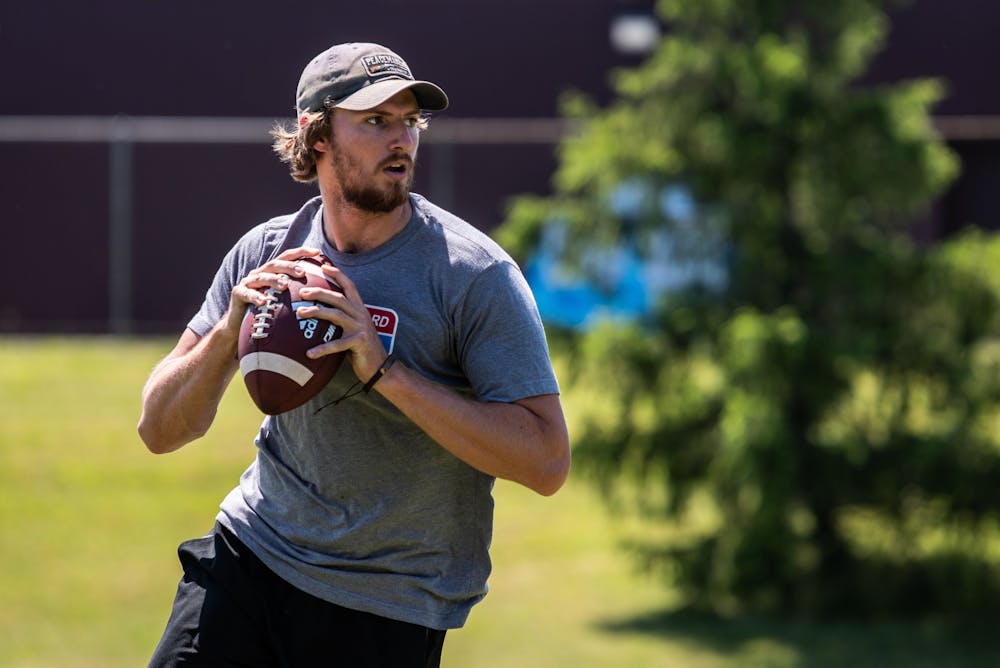CMU transfer QB Ty Brock knows risk of playing through pandemic, believes it can happen

Ty Brock has a steadfast belief in the freedom of choice.
Through family values and a thorough understanding of the history of the United States and its government, Brock said comprehends what it means to be free.
On Aug. 8, the Mid-American Conference announced the cancellation of its fall sports season. As a result, Brock and his Central Michigan teammates will not play football in 2020. The decision to cancel the season, Brock believes, took away he and his teammates' freedom of choice.
On Aug. 10, Brock, a graduate transfer quarterback from Sam Houston State, released a statement on Twitter voicing his thoughts.
"I'm sick and tired of being robbed of my freedom of choice by people who claim to have my best interest at heart," Brock said in the statement. "My health/safety should be dependent on my decisions alone ... Well right now, that freedom of choice is being taken from us."
Just a day after Brock issued his statement on Twitter, the Big Ten, Pac-12 and Mountain West conferences suspended their respective fall seasons. The Pac-12 suspended all competition until Jan. 1, 2021.
He acknowledges that the ongoing COVID-19 pandemic is a serious matter and that he is not a medical professional. However, with the right measures in place, Brock believes a season can and should be played. He said his willingness to play comes from an understanding of the virus and how it works, as well as a familiarity with his nation's history and a lack of fear for the unknown.
'What do we do now?'
The Chippewas met as a team on Aug. 7 to discuss what practices, meetings and workouts were going to look like under new COVID-19 virus-related restrictions. Brock noted that the team had a plan in place and looked forward to the start of fall camp.
The next day, all of that was cast aside with the MAC's decision to cancel all fall sports for the first time in its history.
"As a team, everybody is just kinda like, 'what do we do now?'" Brock said. "We're still waiting on the MAC to see what this fall is going to look like."
There are several options that could be considered as a way to replace the fall season. The Chippewas could be given a mandatory practice period or all workouts could be made voluntary. The questions don't end with the cancellation of the fall season – they begin.
Brock added CMU's coaches have been transparent with the team and know as much, or as little, as the players do about what's to come for the program and its MAC counterparts.
"It seems like (the coaches) have been in the same boat as us," Brock said, "just waiting on more information the whole summer and finally they got some bad news."
Endorsing the #WeWantToPlay movement
High-profile student-athletes – Clemson's Trevor Lawrence and Ohio State's Justin Fields, among others – have made demands as part of the #WeWantToPlay and #WeAreUnited movements started by athletes in Power Five conferences.
Athletes that are part of the movement want uniform health and safety protocols, the ability to opt-out without penalty and the ability to have a voice.
None of the athletes who step on a collegiate playing surface have or ever will make a penny off of their contributions to their university. However, they are willing to take the risk of playing, whether amid a pandemic or the natural dangers of the game.
"Last time I checked, football was a dangerous, violent sport," Brock said in his statement. "I've got the scars to prove it."
Brock used #WeWantToPlay and endorsed the movement. He believes in what the student-athletes at the head of the movement have to say. In a phone interview, he advocated for retained eligibility for those who choose to opt out or have an underlying health condition that puts them at risk.
His tone turned passionate when made a pitch for playing a season to those in power. To him, having a fall season incentivizes the restrictions that may not be as closely enforced should student athletes decide to go home during what has become an extended offseason.
"When we’re on campus, to an extent, they can control how much we’re exposed to other people," Brock said. "Not having a season not only sends us home, it exposes us to more risk I think. You lose incentive to be smart around big groups of people and everything."
There are a lot of factors still at play with what the future of football is in the MAC. The conference wants to play its fall sports in the spring, however that could create complicated schedules for athletic departments. There are still plenty of facts around the coronavirus to be deciphered as health officials work toward combating it and creating a vaccine.
Brock acknowledged those factors and their importance. However, he's ready to take them on whenever the time comes.
"I understand the fear of the unknown," he said, "but we can't let it cripple us as people, as a team, or as a country."
While he may not be able to overturn any decisions with his words, he's still making his voice heard. He, like any player, wants to play. He knows there is a right way to go about playing during a pandemic and that it is feasible to do so with the right precautions.
"We're grown men," Brock said. "I had two great-grandfathers who were flying missions over Germany and North Africa at age 17. I think we can decide whether we want to play or not at age 22."







